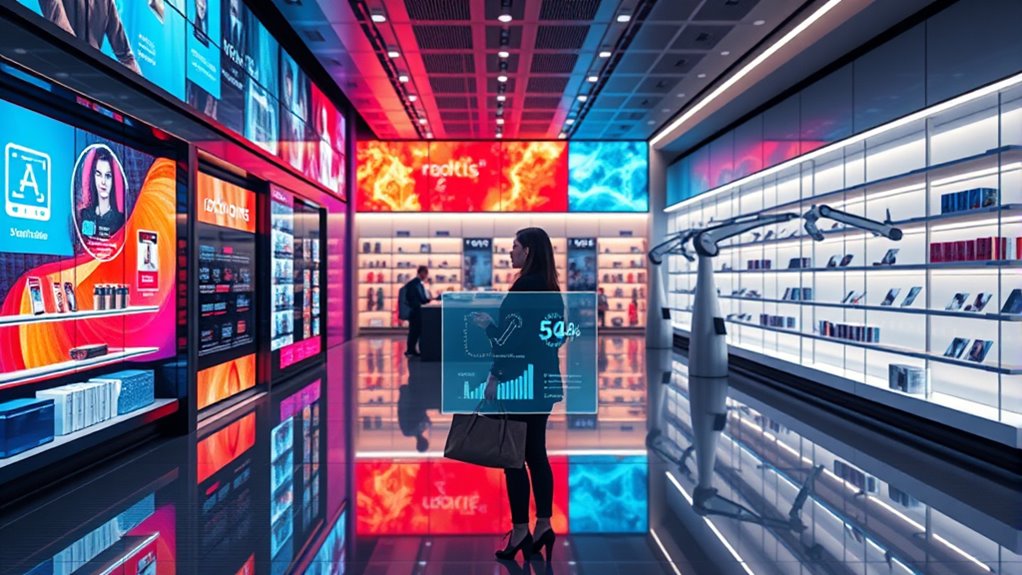AI is transforming digital retail by turning massive amounts of data into personalized shopping experiences and streamlined operations. It helps you personalize product recommendations, optimize pricing, and create dynamic marketing strategies. AI-driven chatbots enhance customer service and automate routine tasks, boosting satisfaction and efficiency. As AI continues to evolve, it empowers you to craft innovative, customer-focused journeys. To explore how this technology is shaping the future of retail, keep exploring the possibilities.
Key Takeaways
- AI analyzes diverse customer data to enable hyper-personalized shopping experiences and tailored marketing strategies.
- Real-time data processing allows dynamic pricing and personalized product recommendations, enhancing customer engagement.
- AI-driven virtual assistants and chatbots improve customer support, creating seamless and responsive retail interactions.
- Automation of operational tasks like returns and order tracking streamlines processes, boosting efficiency and scalability.
- Data-informed design fosters innovation in retail, driving growth, loyalty, and competitive advantage in the digital marketplace.

Have you noticed how AI is transforming digital retail at an unprecedented pace? In just a few years, generative AI-powered shopping traffic in the U.S. surged by 4,700% year-over-year, with over a trillion visits tracked. This exponential growth shows how deeply AI is embedded in consumer behaviors, helping shoppers research products, find discounts, and receive personalized recommendations. During busy seasons, AI tools become even more essential, assisting you with gift ideas, curated browsing, and tailored suggestions that make your shopping experience smoother and more enjoyable. Surveys with thousands of consumers highlight your increasing reliance on AI chat services and browsing assistants, reflecting growing trust and comfort with AI-driven tools. The growth in AI traffic remains notable despite still being modest relative to paid search or email channels. Retailers embracing AI are reaping significant benefits. Those that adopt AI solutions see their sales grow 2.3 times faster than non-adopters, and profits increase by 2.5 times. This financial boost underscores how AI not only enhances your shopping experience but also drives retailer success. As interest in AI expands—online searches for “AI in retail” have risen nearly 600%—retailers prioritize AI to deliver personalized experiences across both digital and physical channels. Beyond personalization, AI streamlines operations through automation, making processes more efficient and responsive. Hyper-personalization is now at the core of retail innovation. AI analyzes enormous datasets—your purchase history, browsing habits, and even real-time factors like weather—to craft tailored experiences. It generates personalized product descriptions, marketing messages, and virtual try-on features that help you make confident choices while reducing friction. Dynamic pricing strategies adjust in real-time based on your preferences and context, creating a seamless journey that matches your expectations. This level of customization increases your chances of finding the right product and fosters loyalty. AI-powered customer service also plays a fundamental role. Virtual agents powered by natural language processing are available 24/7, offering support for routine questions and complex issues alike. These agents proactively assist you, improving satisfaction and reducing wait times. Automation handles returns and order tracking, freeing human agents to focus on more nuanced, empathetic interactions. However, despite the clear benefits, many retailers still struggle with fragmented data and lack the confidence to scale AI solutions across their entire business, limiting the full potential of personalized experiences.
Frequently Asked Questions
How Does AI Personalize Shopping Experiences in Real-Time?
AI personalizes your shopping experience in real-time by analyzing your browsing behavior, purchase history, and current context like weather or nearby events. It instantly updates product suggestions, prices, and marketing messages based on your latest actions. As you shop, AI adapts offers dynamically, creating a seamless, tailored journey across all channels—web, mobile, or in-store—making your shopping more relevant, engaging, and efficient.
What Are the Ethical Considerations of Ai-Driven Retail?
You need to take into account privacy, fairness, transparency, and social impact. Protect customer data with strict safeguards, guarantee compliance with regulations like GDPR, and get informed consent. Avoid biases by monitoring your AI systems regularly to promote fairness. Be transparent about how your AI makes decisions, and give customers ways to challenge unfair outcomes. Also, reflect on how AI affects employment, promoting inclusivity and ethical practices to build trust and social responsibility.
How Does AI Impact Employment in the Retail Sector?
AI considerably impacts retail employment by automating routine tasks like checkouts and inventory management, leading to job displacement in these areas. You’ll see roles shift toward managing AI systems, analyzing customer data, and providing personalized service. While some jobs may decline, new opportunities emerge in AI oversight, maintenance, and high-value consulting. To stay relevant, you should develop skills in AI-related fields, as these will become increasingly essential for retail success.
What Are the Costs Associated With Implementing AI in Retail?
You might think AI costs are too high, but strategic investments pay off in efficiency and customer experience. Implementing AI involves licensing fees, development expenses, and infrastructure upgrades, which can range from thousands to hundreds of thousands annually. Plus, ongoing costs like data management, talent, and compliance accumulate. Careful planning ensures your AI investments deliver measurable value, making the expense worthwhile for long-term retail success.
How Secure Is Customer Data Used by AI Systems?
Customer data used by AI systems isn’t entirely foolproof in security. You face increasing cybersecurity threats, and if you don’t implement strong protection measures, your data can be vulnerable to breaches, hacking, or unauthorized access. To safeguard your customers’ information, you need robust security frameworks, continuous monitoring, and strict access controls. Failing to do so risks damaging trust, facing legal penalties, and losing your competitive edge.
Conclusion
As you embrace these AI-driven innovations, you’ll find the future of digital retail quietly transforming around you. While challenges may gently arise, they pave the way for more personalized, seamless shopping experiences. By trusting in this evolving landscape, you’ll discover new opportunities to connect with customers and enhance your business. Ultimately, this gentle shift promises a brighter, more intuitive retail world—one where technology harmoniously supports your growth and success.











